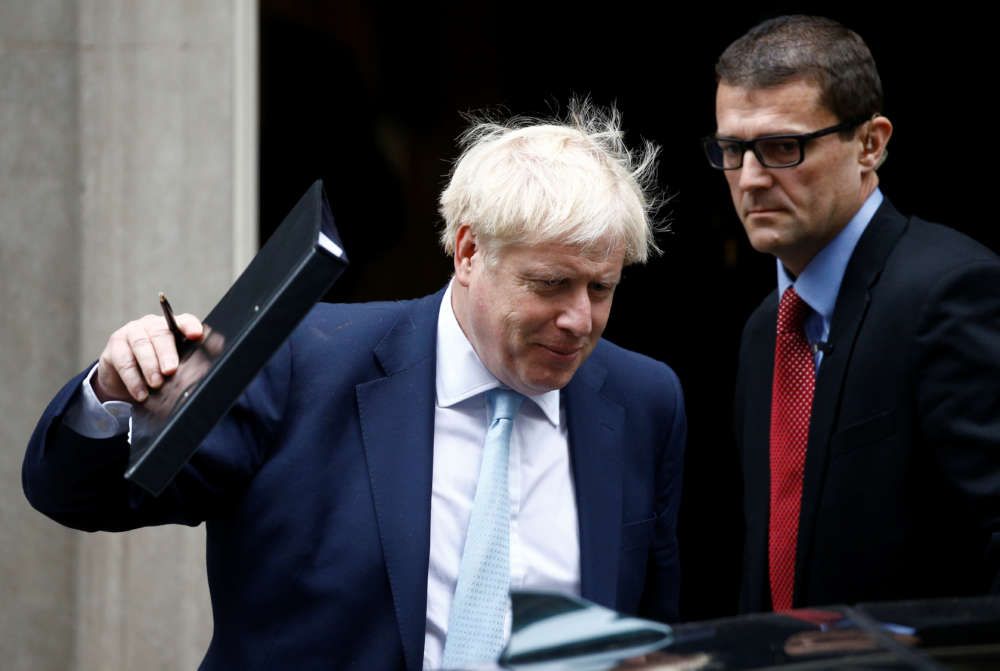Britain set out the type of deal it wants with the European Union on Monday, defining post-Brexit relations between the world’s fifth largest economy and its biggest trading partner.
The main points were set out in a written statement to parliament by Prime Minister Boris Johnson.
Johnson said there was “complete certainty” that a deal will be finished by the end of 2020. Britain is currently operating under EU rules during a time-limited transition period.
He said there were two types of deal available:
1. A deeper trading relationship on the lines of the free trade agreement the EU has with Canada.
2. A relationship based simply on the Brexit Withdrawal Agreement deal agreed in Oct. 2019.
– Any deal cannot include “any regulatory alignment, any jurisdiction for the CJEU (Court of Justice of the European Union) over the UK’s laws, or any supranational control in any area, including the UK’s borders and immigration policy”.
– Johnson said he wants a “suite of agreements” covering:
1. A comprehensive free trade agreement covering substantially all trade.
2. An agreement on fisheries.
3. An agreement to cooperate in the area of internal security.
4. A number of more technical agreements covering areas such as aviation or civil nuclear cooperation.
– All these should have “governance and dispute settlement arrangements appropriate to a relationship of sovereign equals”.
THE FREE TRADE DEAL
Johnson set out 12 areas he believed the deal should cover:
1. National Treatment and Market Access for Goods
“There should be no tariffs, fees, charges or quantitative restrictions between the UK and the EU. There should be a protocol setting out appropriate and modern rules of origin, in order to facilitate trade between the parties to the greatest extent possible.”
2. Trade Remedies
“The agreement should enable the UK to protect its industry from harm caused by unexpected surges in imports of goods or by unfair trading practices, while making the appropriate commitments to transparency, due process and proportionate use of trade remedies.”
3. Technical Barriers to Trade
“There should be provisions to address regulatory barriers to trade in goods, providing for cooperation on technical regulation, standards, conformity assessment procedures and market surveillance, building on the WTO Technical Barriers to Trade Agreement.
“Annexes to the agreement could include provisions facilitating trade in specific sectors, such as organic products, motor vehicles, chemicals and pharmaceuticals, as well as mutual recognition agreements focusing on conformity assessment, with full coverage of the relevant sectors.”
4. Sanitary and Phytosanitary Measures
“The UK will maintain its own autonomous sanitary and phytosanitary regime to protect human, animal and plant life and health and the environment, reflecting its existing high standards.
“In certain areas it may be possible to agree equivalence provisions to reduce practical barriers to trade at the border.”
5. Customs and Trade Facilitation
“Facilitative customs arrangements, covering all trade in goods, should be put in place in order to smooth trade between the UK and the EU.”
6. Cross-Border Trade in Services and Investment
“Significant provisions on trade in services are an essential component of a comprehensive FTA. Accordingly, the Agreement should include measures to minimise barriers to the cross-border supply of services and investment, on the basis of each side’s commitments in existing FTAs.
“In areas of key interest, such as professional and business services, there may be scope to go beyond these commitments.”
7. Temporary Entry for Business Purposes
“The agreement should include significant reciprocal commitments on the temporary entry and stay of individuals, so that both EU and UK nationals can undertake short-term business trips to supply services.”
8. Regulatory Framework
“There should be measures that reduce unnecessary barriers to trade in services, streamlining practical processes and providing for appropriate regulatory cooperation.”
9. Mutual Recognition of Professional Qualifications
“The Agreement should provide a pathway for the mutual recognition of UK and EU qualifications, underpinned by regulatory cooperation, so that qualification requirements do not become an unnecessary barrier to trade.”
10. Financial Services
“The Agreement should require both sides to provide a predictable, transparent, and business-friendly environment for financial services firms, ensuring financial stability and providing certainty for both business and regulatory authorities, and with obligations on market access and fair competition.
“Given the depth of the relationship in this area, there should also be enhanced provision for regulatory and supervisory cooperation arrangements with the EU, and for the structured withdrawal of equivalence findings.”
11. Road Transport
“There should be reciprocal commitments to allow EU and UK road transport operators to provide services to, from and through each other’s territories, with associated rights, underpinned by relevant international agreements and commitments, and ensuring the necessary cooperation on monitoring and enforcement.”
12. Competition Policy, Subsidies, Environment and Climate, Labour, Tax
“The Government will not agree to measures in these areas which go beyond those typically included in a comprehensive free trade agreement.
“The Government believes therefore that both Parties should recognise their respective commitments to maintaining high standards in these areas; confirm that they will uphold their international obligations; and agree to avoid using measures in these areas to distort trade.”
(Reuters)






